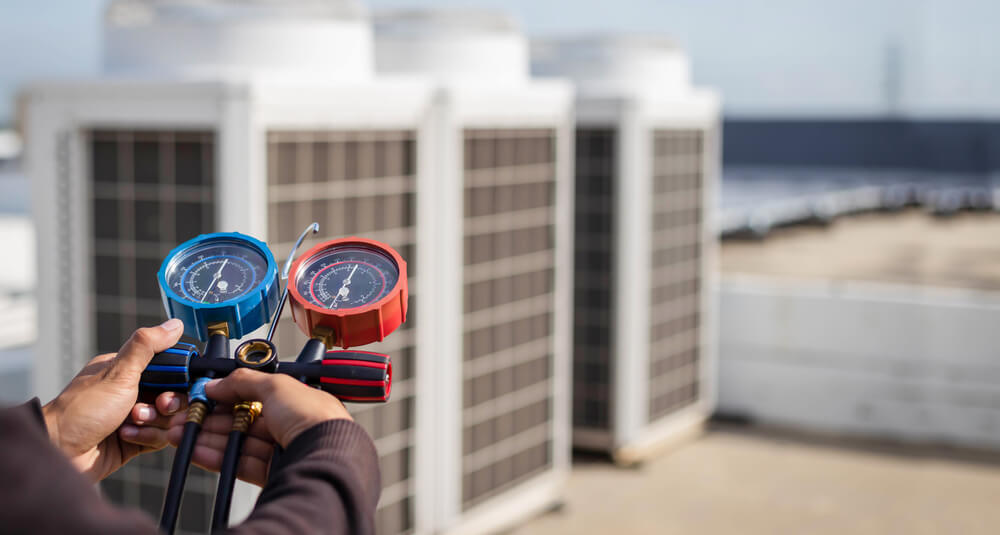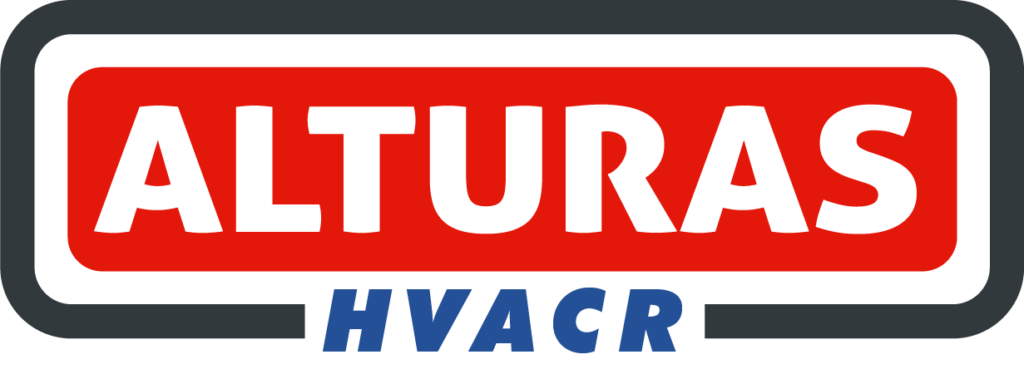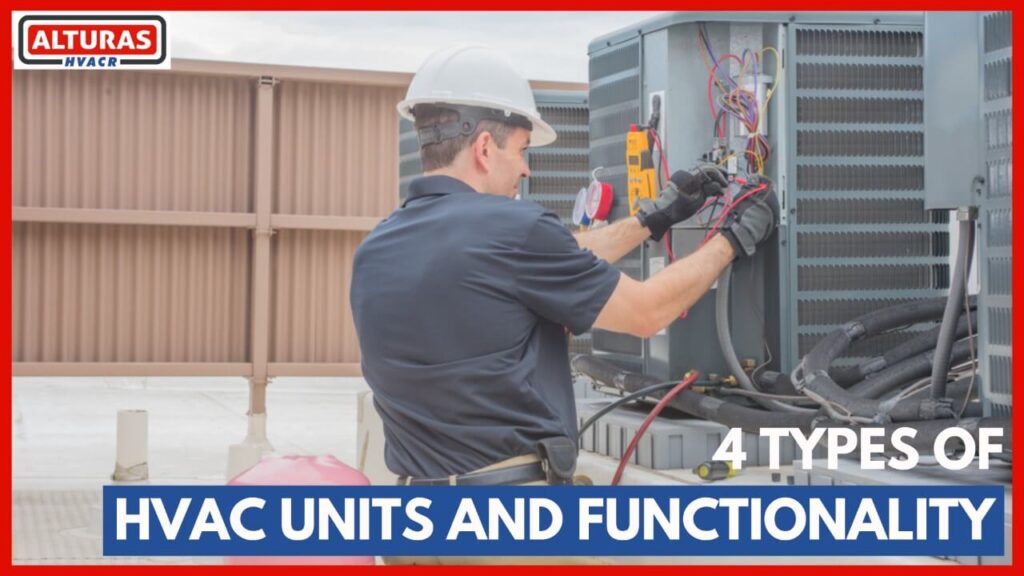Understanding the various HVAC systems available today is essential for achieving the best comfort and energy efficiency in your home or business. Each type of system has its unique design, purpose, and application. In this article, we will explore the 4 primary types of HVAC units, provide detailed explanations of their operation, and discuss their advantages and disadvantages.
1. Heating and Cooling Split Systems
Heating and cooling split systems are among the most commonly used HVAC systems in residential and commercial settings. These systems are called “split” because they consist of two separate units: one located outside and the other inside. The outdoor unit houses the condenser and compressor, while the indoor unit contains the evaporator coil and air handler. This separation allows for more efficient climate control, as each component performs its function in the most suitable environment.
Functionality of Heating and Cooling Split Systems
Heating and cooling split systems work by cycling refrigerant between the indoor and outdoor units to either heat or cool the indoor environment.
- Heating: The system extracts heat from the outdoor air and transfers it indoors via the refrigerant. The refrigerant absorbs the outdoor heat and evaporates in the evaporator coil, warming the indoor air circulated by the air handler.
- Cooling: During cooling, the process is reversed. The refrigerant absorbs heat from the indoor air, carries it to the outdoor unit, and releases it outside, thereby cooling the indoor space.
Also Read: Types of Residential HVAC Systems
Advantages of Heating and Cooling Split Systems
- Energy Efficiency: These systems are highly efficient, often achieving high SEER (Seasonal Energy Efficiency Ratio) ratings, which result in lower energy costs.
- Customizable: The separate indoor and outdoor units allow for flexible installation options.
- Versatility: Can be paired with different air handlers and thermostats to meet various climate control needs.
Disadvantages of Heating and Cooling Split Systems
Maintenance: Requires regular HVAC maintenance to ensure efficiency and longevity, adding to the overall cost.
Installation Complexity: Requires extensive ductwork, which can be challenging and costly in older buildings.
2. Hybrid Split Systems

A hybrid split system is a more advanced version of the traditional split system. It offers the flexibility of a dual-fuel option by combining the efficiency of a heat pump with the reliability of a gas furnace. This system is ideal for those living in regions with fluctuating temperatures, as it automatically switches between electricity and gas to maximize efficiency.
Functionality of Hybrid Split Systems
The hybrid split system works by alternating between the heat pump and gas furnace depending on the outdoor temperature and efficiency needs.
- Heating: In moderate temperatures, the system uses the heat pump to extract heat from the outside air and warm the indoor space. When temperatures drop, it switches to the gas furnace for more effective heating.
- Cooling: The system functions similarly to a standard split system, where the refrigerant absorbs indoor heat and releases it outside.
Advantages of Hybrid Split Systems
- Energy Savings: Maximizes efficiency by using the heat pump in milder weather and switching to the gas furnace in colder conditions.
- Environmental Impact: Reduces fossil fuel use by leveraging the heat pump, which is more eco-friendly.
- Flexible Operation: Automatically adjusts operation based on outdoor temperature for optimal comfort and efficiency.
Disadvantages of Hybrid Split Systems
- Higher Initial Cost: More expensive to purchase and install compared to traditional systems.
- Complex Maintenance: Requires specialized maintenance, which can be more costly and harder to find.
Also Read: HVAC Systems Costs in 2024
3. Duct-Free (Mini-Split) Systems
Duct-free or mini-split systems are a popular choice for homes or buildings without existing ductwork. These systems consist of an outdoor unit connected to one or more indoor units, which are typically mounted on the wall or ceiling. Each indoor unit provides independent climate control for individual rooms or zones, making this system ideal for areas where duct installation is impractical or impossible.
Also Read: What is a Ductless Air Conditioner?
Functionality of Duct-Free (Mini-Split) Systems
Duct-free systems operate by transferring heat between the indoor and outdoor units using refrigerant lines, eliminating the need for ductwork.
- Heating: The system extracts heat from the outdoor air and transfers it directly to the indoor units, providing targeted warmth.
- Cooling: In cooling mode, the indoor units absorb heat from the room and transfer it to the outdoor unit, effectively cooling the space.
Advantages of Duct-Free (Mini-Split) Systems
- Zoned Comfort: Offers precise control over individual rooms or zones, allowing for customized comfort.
- Energy Efficiency: Eliminates energy losses associated with ductwork, making it more efficient.
- Easy Installation: Requires less invasive installation, ideal for retrofitting older homes.
Disadvantages of Duct-Free (Mini-Split) Systems
- Cost: Higher upfront cost, especially when multiple indoor units are needed.
- Aesthetic Impact: Indoor units are visible, which may not suit everyone’s design preferences.
- Maintenance: Requires regular maintenance for each indoor unit to ensure efficiency.
4. Packaged Heating and Air Conditioning Systems
Packaged HVAC systems are all-in-one units that house both the heating and cooling components in a single outdoor unit. These systems are typically used in homes with limited indoor space, such as those without basements or attics. The packaged unit is installed outside the home, often on the roof or a concrete slab, and connects directly to the ductwork to distribute conditioned air throughout the building.
Functionality of Packaged Heating and Air Conditioning Systems
Packaged systems operate similarly to split systems, but with all components housed in a single outdoor unit, making them a space-saving option.
- Heating: The system includes either an electric heat strip or a gas furnace for heating.
- Cooling: Like other HVAC systems, the refrigerant absorbs indoor heat and releases it outside, cooling the indoor air.
Advantages of Packaged Heating and Air Conditioning Systems
- Space-Saving: Combines all components in one outdoor unit, saving indoor space.
- Easy Maintenance: Centralized location simplifies maintenance and repairs.
- Cost-Effective: Generally more affordable to install due to the simpler setup.
Disadvantages of Packaged Heating and Air Conditioning Systems
- Energy Efficiency: May be less efficient than split systems due to all components being exposed to outdoor conditions.
- Noise: The outdoor unit can be noisy, especially in quiet residential areas.
- Limited Customization: Fewer options for customization compared to split systems.
Conclusion
Choosing the right HVAC system is critical for achieving optimal comfort and efficiency in your home or business. By understanding the functionality, advantages, and disadvantages of heating and cooling split systems, hybrid split systems, duct-free systems, and packaged heating and air conditioning systems, you can make an informed decision tailored to your specific needs. Each system offers unique benefits and challenges, so consider your space, budget, and climate control requirements when selecting your HVAC solution.
FAQs
What is the most efficient type of HVAC system?
The most efficient system depends on your specific needs and climate. Hybrid split systems are often praised for their energy efficiency due to their ability to switch between electricity and gas.
Can I install a duct-free system in an older home?
Yes, duct-free or mini-split systems are ideal for older homes without existing ductwork. They are easy to install and allow for zoned heating and cooling.
Are packaged HVAC systems suitable for all homes?
Packaged systems are suitable for homes with limited indoor space or without basements, though they may not be as customizable or efficient as split systems.
How often should I maintain my HVAC system?
Regular maintenance is key to the longevity and efficiency of your HVAC system. It is recommended to have it serviced at least once a year.
What factors should I consider when choosing an HVAC system?
Consider factors like energy efficiency, installation cost, maintenance needs, and the specific heating and cooling requirements of your home or business.

